高中英语必修一第四单元阅读
2019人教版高中英语必修一Unit 4 阅读课 单词 课文预习(

UNIT 4 NATURAL DISASTERS --Reading and Thinking单词,课文预习一.词汇预先知Ⅰ.单词——记其形1.come to their __rescue营救他们2.cause damage to his health 损害他的健康3.destroy hopes 摧毁希望4.build shelters for the homeless 为无家可归者搭建庇护所5.ruin our trip 毁坏我们的旅行6.30 percent students 百分之三十的学生7.be trapped in the__ruins 被困在废墟中8.bury the dead 埋葬死者9.make greater efforts 尽更大的努力Ⅱ.单词——知其意1.disaster n.灾难;灾害2.tornado n. 龙卷风;旋风3.drought n. 旱灾;久旱4.landslide n. (山地或悬崖的)崩塌;滑坡5.slide vi.&vt. (使)滑行;滑动6.tsunami n. 海啸7.flood n. 洪水;大量vi. 淹没;大量涌入vt. 使灌满水;淹没8.magnitude n. (地)震级;重大9.evacuate vt. 疏散;撤出vi. 撤离10.helicopter n. 直升机11.crack n. 裂纹;裂缝vi.&vt. (使)破裂12.gas n. 汽油;气体;燃气13.brick n. 砖;砖块14.metal n. 金属15.electricity n. 电;电能16.unify vi.&vt. 统一;(使)成一体17.context n. 上下文;语境;背景Ⅲ.单词——通其变1.death n.死;死亡→dead adj.无生命的2.shock n.震惊;令人震惊的事;休克vt.(使)震惊→shocking adj.令人震惊的→shocked adj.感到震惊的3.breathe vi.& vt.呼吸→breath n.呼吸4.revive vt.& vi.复活;(使)苏醒→revival n.振兴;复苏5.suffer vt.遭受;蒙受vi.(因疾病、痛苦、悲伤等)受苦→suffering n.折磨;苦难6.wisdom n.智慧;才智→wise adj.明智的;聪明的7.affect__vt.影响;(疾病)侵袭;深深打动→effect n.效果,作用Ⅳ.词块——英汉译1.as if 似乎;好像;仿佛2.in ruins 严重受损;破败不堪3.in shock 震惊;吃惊4.set up 建立5.as usual 像往常一样6.come to an end 结束7.the number of ……的数量8.dig out 挖掘9.a home to ……的家园10.go through 经历11.be gone 没有了12.provide medical care 提供医疗服务二.课文精研读原文呈现THE NIGHT THE EARTHDIDN’T SLEEPStrange things were happening in the countryside of northeastern①Hebei.For several days, the water in the village wells② rose③ and fell,rose and fell.There were deep cracks that appeared in the well walls.At least one well had some smelly④ gas coming out of it【1】.Chickens and even pigs were too nervous to eat【2】,and dogs refused to go inside buildings.Mice ran out of the fields looking for places to hide【3】,and fish jumped out of the water.At about 3:00 a.m., on 28 July 1976, bright lights were seen in the sky outside the city of Tangshan and loud noises were heard.But the city’s one million people were asleep⑤ as usual⑥ that night.【1】“coming out of it”在此为现在分词短语作后置定语,修饰gas。
人教版高中英语必修第一册第四单元_Lesson 5 Reading for Writing
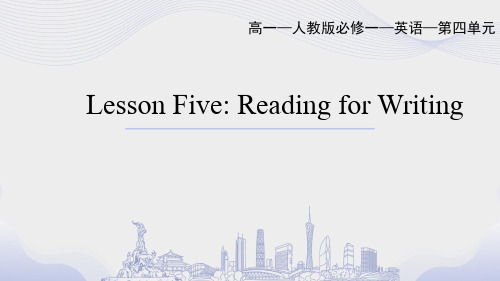
新闻报道类(记叙文类)Summary的写作要点
1. 通读全文,划出主题句,找到5个“W”和1个“H”和 effect ; 2. 分析文章结构,提炼要点,确定行文逻辑;
表达主线为:When and where, Who did what? Why and How? What effect?
注意:Summary可以是概括, 也可以是概述(文章的缩写),两者的区别为: (1)概要(摘要)较短,50-70词, 高度概括文章的主旨大意; (2)概述(缩写)是对中心内容进行概括,长度约为原文的1/3,可保留文章的少 量关键细节。
What elements should be contained in a summary? Five Ws and one H (who, what, where, when, why, and how) and effect
HOW TO WRITE A SUMMARY
What is a summary? A summary is a short statement of main points. A summary paragraph tells the main ideas and the most important information of a longer passage.
Thank You!
高一—人教版—英语—第四单元
Lesson Five: Reading for Writing 答疑
Today’s Homework:
Write a summary (概要 50-70words) of the given passage “THE STORY OF AN EYEWITNESS” on textbook P.92.
2019外研版高中英语必修一Unit4 阅读专练

Unit4 阅读专练一、阅读理解(2019课标全国I,D)ADuring the rosy years of elementary school(小学), I enjoyed sharing my dolls and jokes, which allowed me to keep my high social status. I was the queen of the playground. Then came my tweens and teens, and mean girls and cool kids. They rose in the ranks not by being friendly but by smoking cigarettes, breaking rules and playing jokes on others, among whom I soon found myself.Popularity is a well-explored subject in social psychology. Mitch Prinstein, a professor of clinical psychology sorts the popular into two categories: the likable and the status seekers. The likables' plays-well-with-others qualities strengthen schoolyard friendships, jump-start interpersonal skills and, when tapped early, are employed ever after in life and work. Then there's the kind of popularity that appears in a adolescence: status born of power and even dishonorable behavior.Enviable as the cool kids may have seemed, Dr. Prinstein's studies show unpleasant consequences. Those who were highest in status in high school, as well as those least liked in elementary school, are "most likely to engage(从事)in dangerous and risky behavior. "In one study, Dr. Prinstein examined the two types of popularity in 235 adolescents, scoring the least liked, the most liked and the highest in status based on student surveys (调查研究). "We found that the least well-liked teens had become more aggressive over time toward their classmates. But so had those who were high in status. It clearly showed that while likability can lead to healthy adjustment, high status has just the opposite effect on us. "Dr. Prinstein has also found that the qualities that made the neighbors want you on a play date-sharing, kindness, openness-carry over to later years and make you better able to relate and connect with others.In analyzing his and other research, Dr. Prinstein came e to another conclusion:Not only is likability related to positive life outcomes, but it is also responsible for those outcomes, too. "Being liked creates opportunities for learning and for new kinds of life experiences that help somebody gain an advantage," he said.1. What sort of girl was the author in her early years of elementary school?A. Unkind.B. Lonely.C. Generous.D. Cool.2. What is the second paragraph mainly about?A. The classification of the popular.B. The characteristics of adolescents.C. The importance of interpersonal skills.D. The causes of dishonorable behavior.3. What did Dr. Prinstein's study find about the most liked kids?A. They appeared to be aggressive.B. They tended to be more adaptable.C. They enjoyed the highest status.D. They performed well academically.4. What is the best title for the text?A. Be Nice-You Won't Finish LastB. The Higher the Status, the BetterC. Be the Best-You Can Make ItD. More Self-Control, Less AggressivenessB(2017课标全国Ⅱ,B)I first met Paul Newman in 1968, when George Roy Hill, the director of Butch Cassidy and the Sundance Kid, introduced us in New York City. When the studio didn't want me for the film-it wanted somebody as well known as Paul-he stood up for me. I don't know how many people would have done that; they would have listened to theiragents or the studio powers.The friendship that grew out of the experience of making that film and The Sting four years later had its root in the fact that although there was an age difference, we both came from a tradition of theater and live TV. We were respectful of craft(技艺)and focused on digging into the characters we were going to play. Both of us had the qualities and virtues that are typical of American actors: humorous, aggressive, and making fun of each other-but always with an underlying affection. Those were also at the core(核心)of our relationship off the screen.We shared the belief that if you' re fortunate enough to have success, you should put something back-he with his Newman's Own food and his Hole in the Wall camps for kids who are seriously ill, and me with Sundance and the institute and the festival. Paul and I didn't see each other all that regularly, but sharing that brought us together. We supported each other financially and by showing up at events.I last saw him a few months ago. He'd been in and out of the hospital. He and I both knew what the deal was, and we didn't talk about it. Ours was a relationship that didn't need a lot of words.5. Why was the studio unwilling to give the role to the author at first?A. Paul Newman wanted it.B. The studio powers didn't like his agent.C. He wasn't famous enough.D. The director recommended someone else.6. Why did Paul and the author have a lasting friendship?A. They were of the same age.B. They worked in the same theater.C. They were both good actors.D. They had similar characteristics.7. What does the underlined word "that" in paragraph 3 refer to?A. Their belief.B. Their care for children.C. Their success.D. Their support for each other.8. What is the author's purpose in writing the text?A. To show his love of films.B. To remember a friend.C. To introduce a new movie.D. To share his acting experience.二、七选五(2020浙江)I experienced years of loneliness as a child. 1 His friends teased him about babysitting his sister and his interests were far different from mine. With no other kids of my age in the neighborhood, I had to spend hours by myself.A bright spot for me turned out to be reading. My love of the written word began early as my mother read to me every evening. 2 I started reading books on my own before age 5 and my mother took me to the public library once a week to borrow several books. I quickly graduated from typical children's books to ones with fewer pictures and longer chapters. Reading opened new worlds to me. 3My mother also encouraged me to make what I wanted. I tried making toy cars with cardboard boxes and constructing buildings from leftover cardboard and bits of wood my father gave me. When my mother saw my creations, she told me how creative my designs were. 4 I learned a lot about how to extend the life of objects and transform them into something new and useful. It was a trait(特点)others found helpful, and I soon had friends who wanted to make things with me.5 My parents made it a point for their two kids to spend time outside, no matter the weather or season. My brother, of course, raced off to be with his friends, while I had plenty to do myself. There was making leaf houses in autumn, ice skating in winter, and so much more. They' re all memories treasure today.A. I wasn't alone any longer.B. I enjoyed reading stories aloud.C. I was invited to play with another kid.D. I loved the colorful photographs in the books.E. Another habit I formed early was being outdoors.F. Thus, I began my lifelong interest in making things.G. My older brother couldn't be bothered to play with me.1. ________2. ________3. ________4. ________5. ________参考答案:一、阅读理解A语篇解读:本文体裁为说明文,主题语境为人与社会,主题语境内容为社会交往。
高中英语人教必修一第四单元阅读课教学设计
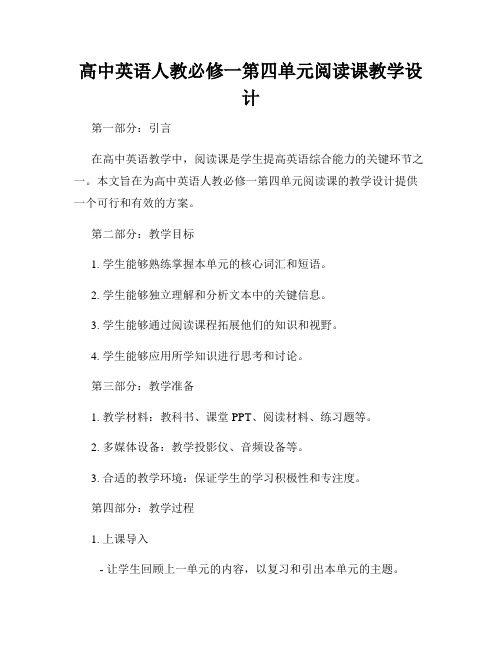
高中英语人教必修一第四单元阅读课教学设计第一部分:引言在高中英语教学中,阅读课是学生提高英语综合能力的关键环节之一。
本文旨在为高中英语人教必修一第四单元阅读课的教学设计提供一个可行和有效的方案。
第二部分:教学目标1. 学生能够熟练掌握本单元的核心词汇和短语。
2. 学生能够独立理解和分析文本中的关键信息。
3. 学生能够通过阅读课程拓展他们的知识和视野。
4. 学生能够应用所学知识进行思考和讨论。
第三部分:教学准备1. 教学材料:教科书、课堂PPT、阅读材料、练习题等。
2. 多媒体设备:教学投影仪、音频设备等。
3. 合适的教学环境:保证学生的学习积极性和专注度。
第四部分:教学过程1. 上课导入- 让学生回顾上一单元的内容,以复习和引出本单元的主题。
- 引入本单元的主题,激发学生的学习兴趣。
2. 预习任务- 学生在课前阅读教科书中的相关阅读材料,了解文章的大意和关键内容。
- 学生可以在教室中小组讨论或写下一到两个问题。
3. 教师示范- 教师用板书或PPT展示关键词汇和短语,并解释其意义和用法。
- 教师带领学生朗读和理解文本中的关键句子和段落。
4. 学生合作活动- 学生以小组形式讨论和分享他们的预习问题,教师引导他们扩展思维和观点。
- 学生可以进行角色扮演或小组演示,以提高他们的口语表达能力。
5. 阅读理解- 学生阅读教科书中的阅读材料,并回答与之相关的问题。
- 教师可进行个别辅导,帮助学生理解和解决阅读中的困惑。
6. 扩展活动- 教师可安排一些扩展活动,如观看相关视频、听取相关音频或阅读相关文章。
- 学生可以进行小组讨论或写下他们的观点和反思。
7. 总结评价- 教师对学生的表现进行评价和总结,鼓励他们的努力和进步。
- 学生可以自评和互评,以促进他们的学习动力和自我反思。
第五部分:作业布置1. 学生可完成课后阅读和练习题,巩固对本单元内容的理解和掌握。
2. 学生可撰写一篇关于本单元主题的小作文,以提高他们的写作能力。
人教版高中英语必修一 Unit4_阅读理解(自然灾难篇) 题型专项突破 Word版含答案
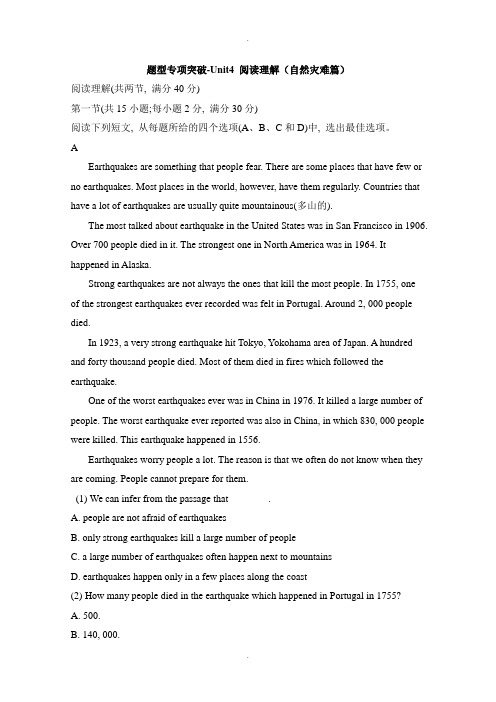
题型专项突破-Unit4 阅读理解(自然灾难篇)阅读理解(共两节, 满分40分)第一节(共15小题;每小题2分, 满分30分)阅读下列短文, 从每题所给的四个选项(A、B、C和D)中, 选出最佳选项。
AEarthquakes are something that people fear. There are some places that have few or no earthquakes. Most places in the world, however, have them regularly. Countries that have a lot of earthquakes are usually quite mountainous(多山的).The most talked about earthquake in the United States was in San Francisco in 1906. Over 700 people died in it. The strongest one in North America was in 1964. It happened in Alaska.Strong earthquakes are not always the ones that kill the most people. In 1755, oneof the strongest earthquakes ever recorded was felt in Portugal. Around 2, 000 people died.In 1923, a very strong earthquake hit Tokyo, Yokohama area of Japan. A hundred and forty thousand people died. Most of them died in fires which followed the earthquake.One of the worst earthquakes ever was in China in 1976. It killed a large number of people. The worst earthquake ever reported was also in China, in which 830, 000 people were killed. This earthquake happened in 1556.Earthquakes worry people a lot. The reason is that we often do not know when they are coming. People cannot prepare for them.(1) We can infer from the passage that________.A. people are not afraid of earthquakesB. only strong earthquakes kill a large number of peopleC. a large number of earthquakes often happen next to mountainsD. earthquakes happen only in a few places along the coast(2) How many people died in the earthquake which happened in Portugal in 1755?A. 500.B. 140, 000.C. 830, 000.D. About 2, 000.(3) When and where was the worst earthquake ever reported?A. 1964;Alaska.B. 1556;China.C. 1923;Japan.D. 1979;China.(4) According to the passage, which of the following is NOT true?A. The stronger the earthquake is, the more people are killed.B. Earthquakes often come unexpectedly.C. Earthquakes can cause fires.D. People still don’t know when an earthquake will come.答案:(1)-(4) C D B A解析:(1) 细节理解题。
book1 unit4 Earthquakes 地震

Step 3. Careful reading
Read the est answers.
Step 3. Careful reading
1. Which of the following is NOT the reason that so many people were killed or injured in this disaster? A. It happened in the night and people were sleeping. B. The earthquake was one of the largest earthquakes ever. C. There was little water in the city. D. Two big quakes shook the city.
Step 6. Your show time
Choose a paragraph and act out an interview between a reporter and two survivors from the Tangshan earthquake.
Step 6. Your show time reporter
injure
破坏;毁坏;消灭
无用的;无效的 援救;营救 陷阱;困境
104
电;电流;电学
灾难;灾祸
dig out
bury
miner a number of reporter
408
congratulation
burst
million event
right away
新人教必修一Unit 4 natural disasters Reading阅读高中英语课件
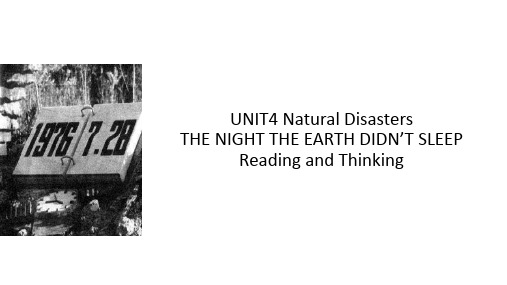
Activity 2
Draw a mind map and describe the text in your own words.
before the earthquake
signs: wells: ________ animals: _____________ lights & sounds: ___________
1976.
Structure
Main idea of each paragraph
Part 1: para1 before the earthquake
para1: Warning signs before the earthquake.
Part 2: para2&3 during the earthquake
Tangshan today
While-reading
Activity1 What’s the main idea of the text? How many parts does it include? Write down the main idea of each paragraph.
It mainly talks about the big earthquake that happened in Tangshan in
The night the earth didn’t sleep
before the earthquake during the earthquake
人教版高中英语必修一高中一年级()Unit4Earthquakes(含答案解析及听力mp3)
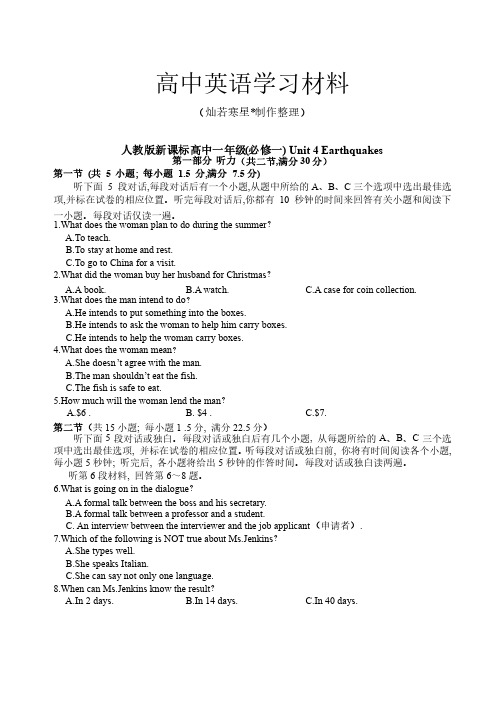
高中英语学习材料(灿若寒星*制作整理)人教版新课标高中一年级(必修一) Unit 4 Earthquakes 第一部分 听力(共二节,满分30分) 第一节 (共 5 小题; 每小题 1.5 分,满分 7.5分)听下面听下面5 段对话,每段对话后有一个小题,从题中所给的A 、B 、C 三个选项中选出最佳选项,并标在试卷的相应位置。
听完每段对话后,你都有你都有10 秒钟的时间来回答有关小题和阅读下一小题。
每段对话仅读一遍。
一小题。
每段对话仅读一遍。
1.What does the woman plan to do during the summerA.To teach.B.To stay at home and rest.C.To go to China for a visit. 2.What did the woman buy her husband for Christmas ?A.A book.B.A watch.C.A case for coin collection. 3.What does the man intend to doA.He intends to put something into the boxes.B.He intends to ask the woman to help him carry boxes.C.He intends to help the woman carry boxes. 4.What does the woman mean ?A.She doesn A.She doesn’’t agree with the man.B.The man shouldn B.The man shouldn’’t eat the fish.C.The fish is safe to eat. 5.How much will the woman lend the man ?A.$6 .B. $4 .C.$7. 第二节(共15小题; 每小题1 .5分, 满分22.5分)分) 听下面5段对话或独白。
- 1、下载文档前请自行甄别文档内容的完整性,平台不提供额外的编辑、内容补充、找答案等附加服务。
- 2、"仅部分预览"的文档,不可在线预览部分如存在完整性等问题,可反馈申请退款(可完整预览的文档不适用该条件!)。
- 3、如文档侵犯您的权益,请联系客服反馈,我们会尽快为您处理(人工客服工作时间:9:00-18:30)。
Parts division(5minutes)
❖ Part 1( 1 )
There were signs before the earthquake but no
_a_t_te_n_ti_o_n_w_a_s__p_a_id_. ______________________ ❖ Part 2 ( 2-3)
Reading for main ideas
1. Find the topic sentence of each paragraph (2minutes)
❖ Paragraph1 _S__tr_a_n_g_e__th_i_n_g_s_w__e_r_e_h_a_p_p_e_n_i_n_g__in__th_e__c_o_u_n_t_ry_s_i_d_e__
• But the one million people of the city, who thought little of these events, were asleep as usual that night.
paragraph 2 (3’)
Find the sentences to show it was a big earthquake.
Paragraph 3 Discuss the following questions: After the big earthquake, why were water, food, and electricity hard to get?
•Dams fell and wells were filled with sand. •Nearly everything was destroyed, including the electricity poles(电线杆)and power station.(发电站) Cows, chickens and pigs were killed or frightened, so milk and meat were hard to get. Besides, the railway tracks were useless. As a result, some food were also difficult to transport there.
buildings lay in ruins. pieces of steel.
A man was trapped in ruins, waiting for help.
The rescue team were searching for the survivors in the earthquake.
It seemed as if the world was at an end! It was felt in Beijing… 1/3 of the nation felt it. In 15 seconds, a large city lay in ruins. The suffering of the people was extreme. (died, be injured, be killed, be left without parents)……….
Mice looked for places to
Animals were too hide. Fish jumped out of
nervous to eat. bowls and ponds.
There were bright lights in the sky.
Loud sound could be heard.
The earthquake caused great damage (loss) during
_th_e_e_a_r_th_q_u_a_k_e_. _________________________ ❖ Part 3 ( 4 ) _H_e_lp__c_am__e_s_o_o_n_a_f_te_r_t_h_e_e_a_rt_h_q_u_a_k_e._________
Water pipes cracked and burst.
Which sentence can be replaced by the following sentence ?
However, people of Tangshan paid little attention to the things happening around them and went to sleep as they usually do that night.
A disaster ---earthquake hit Wenchuan.
July 28,1976
The earthquake
Huge cracks cut across
destroyed everything roads and the railway
and factories and tracks became useless
Clue(线索)of the Passage:
Reading for facts(3’)
Paragraph 1: warning signs before an earthquake
Water in wells rose and fell.
Smelly gas came out of wells.
o_f _n_o_r_th_e_a_s_t__H_e_b_e_i._ ❖ Paragraph2 __A__t_3_:4_2__a_m__e_v_e_r_y_th_i_n_g__b_e_g_a_n_t_o__s_h_a_k_e_. __________ ❖ Paragraph 3
E_v_e_r_y_w_h_e_r_e__th_e_y__lo_o__ke_d__n_e_a_r_ly__e_v_e_r_y_th_i_n_g_w__a_s____ d_e_s_t_ro__ye__d_. ❖ Paragraph 4 ❖ _A__ll_h_o_p__e_w_a_s__n_o_t_l_o_s_t._______________
